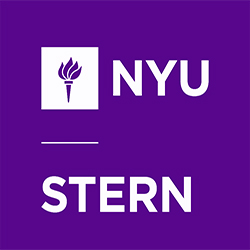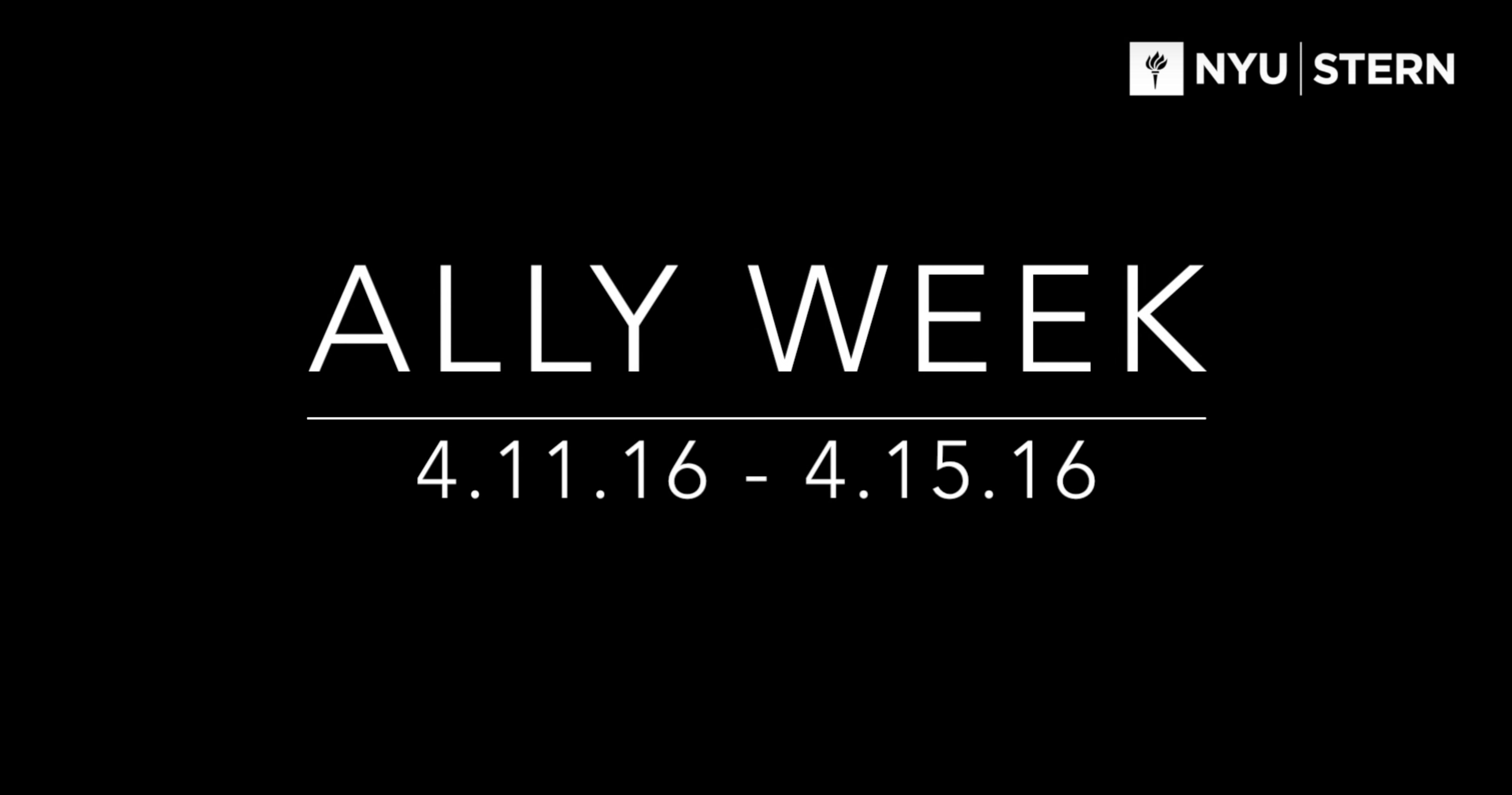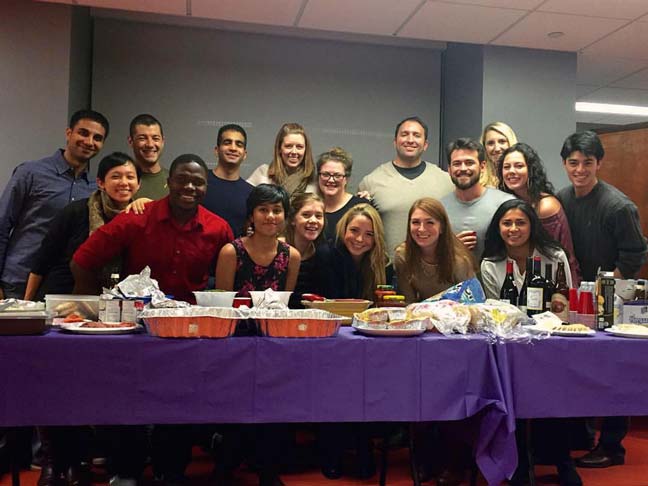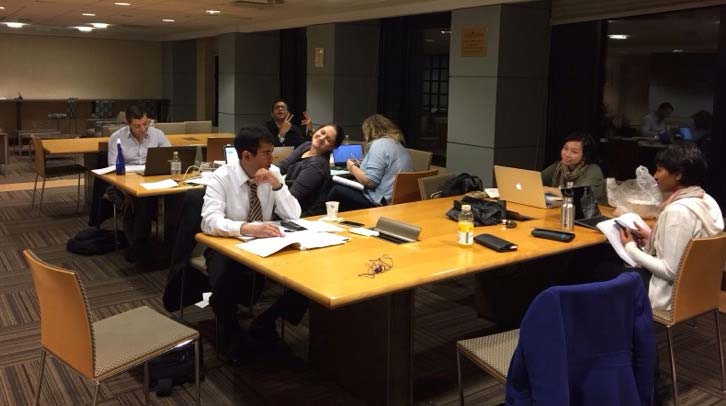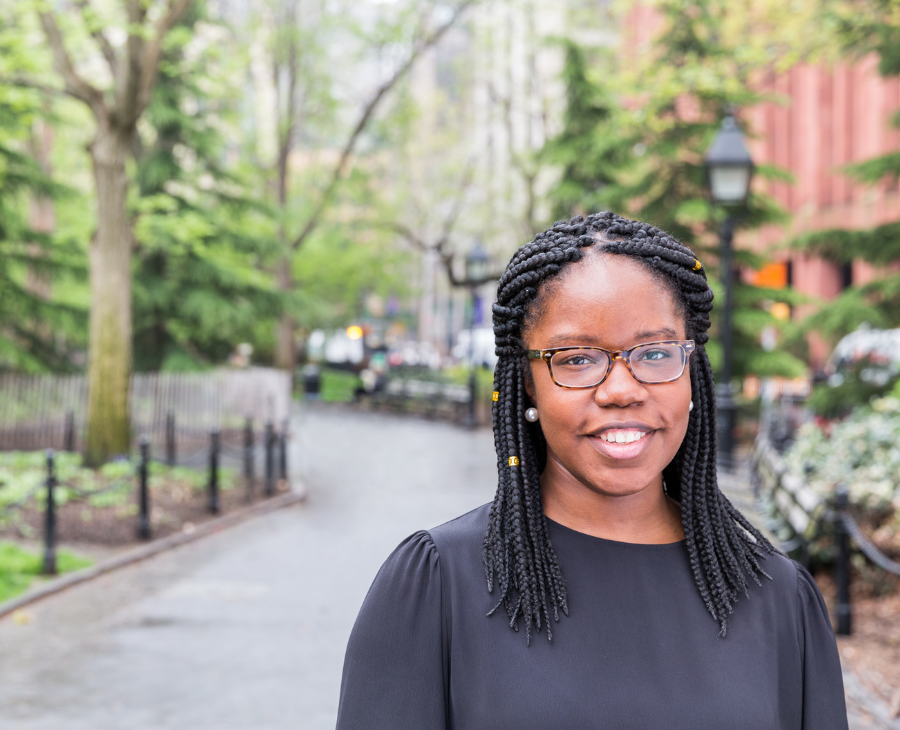 Erica Hartsfield is a Senior Associate Director of MBA Admissions and has worked at NYU Stern for over 5 years on both the events marketing and digital marketing teams. Outside of work, Erica is an avid Chicago sports fan (go Bears!), puzzle enthusiast, history buff, and MPA candidate at NYU Wagner.
Erica Hartsfield is a Senior Associate Director of MBA Admissions and has worked at NYU Stern for over 5 years on both the events marketing and digital marketing teams. Outside of work, Erica is an avid Chicago sports fan (go Bears!), puzzle enthusiast, history buff, and MPA candidate at NYU Wagner.“Who should I ask to write my letters of recommendation?” is a question we get often from prospective students. On one hand, the answer seems pretty straightforward: ask a current or previous supervisor. In practice, the answer is a bit more complex. Letters of Recommendation (LORs), or EQ Endorsements as we call them at Stern, are one of the few external inputs that candidates include in their application. But why do we ask for them? And who should you actually ask to write a recommendation?
The Purpose of Letters of Recommendation
- Support your candidacy.
- Bring to life the story in your application through the viewpoint of someone who knows you well.
NYU Stern’s EQ Endorsements
At Stern, our letters of recommendation are called EQ Endorsements. Our EQ Endorsements are similar to a common LOR, but we ask your endorser to provide a specific example of your EQ, or emotional intelligence. Our community values EQ, and this is an opportunity to hear how candidates embody this core pillar of our community through the experience of their endorser.
Picking Endorsers
You should be selective when deciding who to ask for an EQ Endorsement. At Stern, we encourage at least one professional EQ Endorsement from a current or recent manager. The second endorsement is up to you ( you should avoid anyone who may be biased like family members or significant others). Most importantly, select endorsers who know you and can speak to your contributions and strengths. We can usually tell if you haven’t worked closely with an endorser, so you won’t get extra points for including a letter from an executive just because of their title.
Managing the “Ask”
Once you’ve identified who you want to ask, think about how you’ll manage this process. Here are some tips for ‘managing the ask’:
- Reach out early. Make a list of people you want to reach out to for EQ Endorsements, and ensure you give them enough time to write a good endorsement.
- Don’t tell your recommender what to write about you. Remember, endorsements should be external insight that supports your application. Instead, have a conversation with your endorser to remind them of your accomplishments and share context about why you want to pursue your MBA.
- Follow up. Stay in touch with your endorsers and follow up as needed. People often miss application deadlines because they are missing an EQ endorsement.
- Send a thank you note! It seems obvious, but it’s an important step. Your endorsers have taken time to advocate for you in this journey, so remember to thank them for their support.
Ultimately, EQ endorsements build on the story you’re telling in your application. If your voice in your application says “this is who I am and this is what I’ve done”, your endorsements should say “that’s true, and here’s how”.
Tips from a Stern Reapplicant
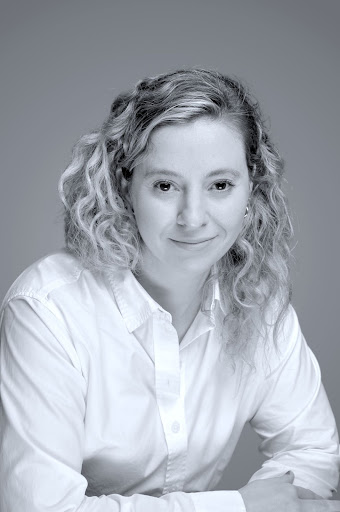 Jade Burger MacNee is in her first year of the Full-Time MBA program, specializing in Marketing and Media & Entertainment. Prior to Stern, Jade worked in the Fashion and Beauty Industry in companies such as Estée Lauder, Tory Burch and PVH. She is originally from Brazil, where she started her career working as a producer for multiple international fashion magazines including Vogue US, GQ, W and V Magazine.
Jade Burger MacNee is in her first year of the Full-Time MBA program, specializing in Marketing and Media & Entertainment. Prior to Stern, Jade worked in the Fashion and Beauty Industry in companies such as Estée Lauder, Tory Burch and PVH. She is originally from Brazil, where she started her career working as a producer for multiple international fashion magazines including Vogue US, GQ, W and V Magazine.
How does one find their own path in life? What is yours? These were the questions that time and time again I asked myself, especially when I was working on my two applications for NYU’s MBA program.
Yes, you read it right. I applied to the Stern MBA program twice. My first attempt to embark on the MBA journey was cut short after being waitlisted and ultimately declined admission. But everything changed in 2022 when I received a phone call that shook my life upside down and secured me a place in the class of 2024.
As I soul searched between my first and second applications, I started discovering in me an unexpected sense of resiliency and confidence. In the fall of 2021, I found myself once again dreading each and every piece of information required for NYU’s application. I wanted to put my best foot forward and was scared of missing the point. However, I took a deep breath and decided to face my fears. I wanted to show how I evolved and why I am constantly motivated by change.
The first time I applied, I had explained why I wanted to pivot careers and learn how to be a marketer. In my second application, I was able to say that I conquered my goal. I had worked hard throughout the year to make the pivot on my own, and was excited to show Stern the thought I’d put into my time between applications. It takes courage to act and determination to change, and I showed Stern that I was committed to finding new paths in my life. If you ever find yourself in this position, think of action items you can work on between applications. Even if you don’t fully get there, you will already be on the right track. And don’t forget to highlight your short-term achievements in your new essays.
Another area that I was able to improve was the Pick 6. My first one was good, but the second one was real. Don’t be afraid to show blurry photos. The most important thing I wanted to demonstrate through the photos is my everyday life. I did not realize at first how powerful being real can be. So, after putting it together, I discovered that I am really passionate about all the small things in my life such as cooking with family or reuniting with friends at a wedding. This was certainly a shift from the photos I had before, which I felt focused too heavily on my work and professional life.
My application process felt like a roller coaster, full of ups and downs. However, it made me think of all my successes and failures through a different lens. NYU Stern taught me to be proud of all my achievements even before the first week of class. I am happy to say that everything I expected from the NYU community was correct. Stern is definitely a place where competition gives way to camaraderie. The EQ is real here at NYU – trust me.
The Stern Community: The Only Thing I Wish Would Never “Change”
 Jeet Khilnani is an MBA2, specializing in strategy and leadership & change management. Prior to Stern, Jeet worked at Nomura in a corporate finance role, and Deloitte in an audit role. This summer, Jeet interned at Boston Consulting Group (BCG) as a Summer Consultant and will be continuing to work at the firm post graduation, in New York City. Additionally, Jeet is the Co-President of Outclass (Stern’s LGBTQ+ organization), and a VP of Stern Student Government, Management Consulting Association, Graduate Finance Association, and South Asian Business Association at Stern.
Jeet Khilnani is an MBA2, specializing in strategy and leadership & change management. Prior to Stern, Jeet worked at Nomura in a corporate finance role, and Deloitte in an audit role. This summer, Jeet interned at Boston Consulting Group (BCG) as a Summer Consultant and will be continuing to work at the firm post graduation, in New York City. Additionally, Jeet is the Co-President of Outclass (Stern’s LGBTQ+ organization), and a VP of Stern Student Government, Management Consulting Association, Graduate Finance Association, and South Asian Business Association at Stern.
From the time I committed to attending Stern, the one thing that I kept wondering about (rather, worrying about) was the community at Stern. Being an international student who has never lived in the US before, I had heard a lot – that New York City is the big, bad concrete jungle, that people would do anything to get to their goals, and there really isn’t much of a community at a big city school like Stern. I’m sure quite a few of you reading this would’ve also heard / believe the same about Stern / NYC.
Diversity of the Class
As a result of these thoughts, I came into the city with a lot of questions about who my classmates were going to be, what it was going to be like working with them, how competition will bring out the best and worst in us, and more. But I couldn’t have been more wrong. Within a few days of being at Stern, I saw my classmates were every bit as incredible as they seemed in the first Zoom meeting we had. Nobody was just ‘playing’ nice, but they were genuinely incredible human beings. I think it’s because we all, no matter where we come from, left stable jobs and took on some risk to go to business school and take the plunge towards a new career. We all came in with some amount of anxiety, some amount of imposter syndrome and some amount of being awestruck that we’re in New York City. The outcome of all that is a large, diverse community of kind, inclusive, intelligent people who would travel significant lengths to help you succeed.
Building Relationships
My first few friends were ones who I’d met at Zoom over a virtual admitted students happy hour, where week after week we had new icebreakers and fun games. It felt surreal to be meeting people again in the Fall of 2021, after a rather rough year and a half spent largely in confinement and solitude thanks to COVID. But the connection was instant – we were all so happy to meet each other (finally!) and begin this incredible journey of two years, one that would for all practical purposes transform our lives.
We also were put into study groups of 5-6 people by the school to work on our “Group Pick Six”, an assignment due before LAUNCH. It was a great way to meet my study group, break the ice with them and work on an interesting assignment together. I think getting six pictures from six individuals can be an interesting way to set up group dynamics – Does each one get to pick one? How do we deal with overlaps? What do we want to say as a team? We had a lot of fun in one hour and found out six common attributes we all shared, for example, we all love adventure!
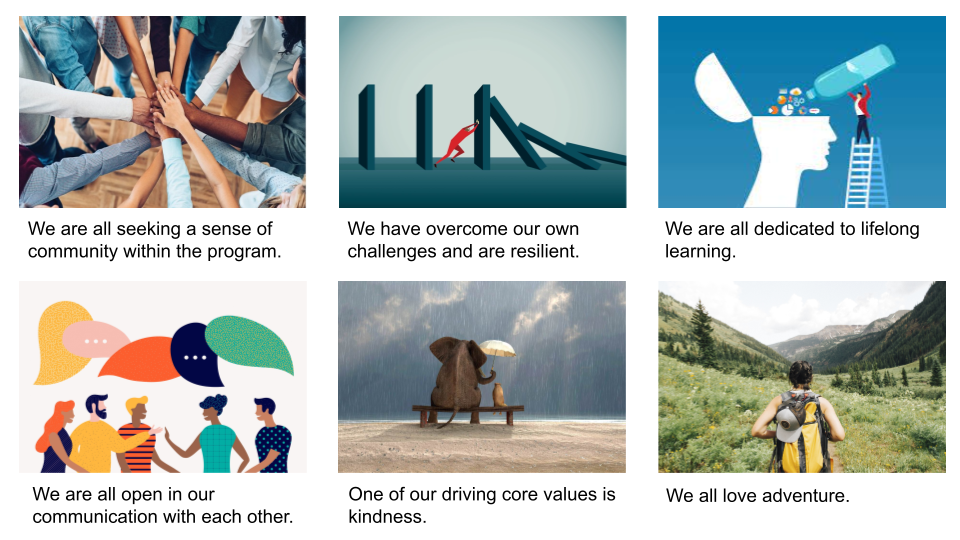
As school began, we had LAUNCH- which was simply one whole week of awesome. One of my life’s most treasured moments was the dinner at Ellis Island, sitting on a table with seven other students I’d never met before, looking at the Manhattan skyline and not being able to believe that all this was real. We all shared that same emotion I guess, and I walked away with one “core memory” (Inside Out reference) and seven new friends. As school progressed, I met more and more people and my friends list kept growing.
Friendships Strengthened through Ups & Downs
Of course, it’s never all just fun and games. That never results in the strongest community in my opinion. And soon enough, our test stood in front of us – recruiting. We all got busy, running from one corporate event to another, one coffee chat after another and a social gathering seemed like the last thing on anyone’s mind. Yet, you could feel the power of the Stern community because despite not having met for days/weeks on end, I felt supported. If I missed an event, my friends would share their notes with me. If there was an assignment due and I was busy, someone else in my project team did the heavy lifting for me, if I was sick (and I did get COVID in week 1 of classes), someone dropped off food at my doorstep.
As Fall progressed, things got even more intense. The weather got colder, but our community grew warmer. Through the holidays, the rejections, the interview prep and the interview season, we stood by each other – sharing resources, questions, case practice, advice and sometimes just holding your hand or giving you a hug. I clearly remember the night before a big final round interview, I was freaking out – I sent a text to a dear friend (also recruiting) and they immediately called me back. We spoke for twenty minutes, they made sure I was calm and wouldn’t do anything to hurt my chances the next day. Right after my interview, I got a call again to check if everything was okay. To me, that gesture alone defines the community at Stern.
Today, I feel like an integral part of the Stern community, and Sternies are an indispensable part of my life. I don’t know what I would do without them, and I couldn’t be more grateful for each and every one of them.
Yes, we’re in New York. Yes, it’s competitive (duh!). Yes, it’s intense. But, we are Stern. We get through it, together. Always have, always will.
Now That You’ve Applied
 Arthur is an MBA2 specializing in Strategy and Entertainment, Media and Technology. In addition to serving as a Graduate Ambassador, he is also a VP of Academics and Case Competitions for the Entertainment, Media and Sports Association (EMSA) and a Teaching Fellow for Pr. Matthew Lee’s core course, Strategy. Born in Dayton, OH, he has lived in New York City for the past 6 years and loves living in the city. He graduated with a BA from Boston College in 2013 and spent the majority of his pre-MBA career in client services roles at GLG. He will be joining ZS Associates full time after graduation after serving as a summer intern at the firm.
Arthur is an MBA2 specializing in Strategy and Entertainment, Media and Technology. In addition to serving as a Graduate Ambassador, he is also a VP of Academics and Case Competitions for the Entertainment, Media and Sports Association (EMSA) and a Teaching Fellow for Pr. Matthew Lee’s core course, Strategy. Born in Dayton, OH, he has lived in New York City for the past 6 years and loves living in the city. He graduated with a BA from Boston College in 2013 and spent the majority of his pre-MBA career in client services roles at GLG. He will be joining ZS Associates full time after graduation after serving as a summer intern at the firm.
Now that application deadlines for the next cycle are past due, I thought I’d share my reflections about what to do now if you’ve submitted your application and are making your final decision. These are not just from my own perspective, but based on questions that I have received from prospective students in the midst of decision-making.
- I’ve applied to Stern and have not yet heard back – what can I do to help my candidacy?
Honestly – not a lot! Admissions will review your application in due time, so give yourself a chance to relax and have confidence in the work you put into it. The best use of time until you receive an update from admissions could be to continue your research into Stern. What sorts of classes or programs might you want to take advantage of? If there is something you can’t find out on the school’s website, consider taking a look at club websites (professional, affinity or social) and reaching out to the VPs of Admissions of clubs to get a student’s perspective on membership.
- I’ve been waitlisted – what do I do now?
This one is close to my heart – I was waitlisted after applying in Round 1 and was eventually granted admission. First, although it might sound difficult, give yourself some credit – being waitlisted is not bad news!
My best advice plays into an idea on which Stern places a lot of emphasis – EQ (Emotional Intelligence). One part of having a high EQ is self-awareness. So if you’re on the waitlist, be self-aware about what you can improve on your application, and focus on what you can control. Things like your past experiences or undergrad GPA are set in stone – those things cannot change. Even your professional experience, while ongoing, can only change so much in the course of a couple of weeks or months. Some things you could consider – retaking a standardized test (if you think you can achieve a higher score), enrolling in an online course (MBAMath, Coursera, etc.), or participating in volunteer opportunities (through work or on your own). Don’t try to improve simply for the sake of improvement though – make decisions as an authentic extension of the story you told in your application.
Finally, be sure to keep the admissions team updated. If there is something new worth sharing (maybe a new test score or an exciting new promotion at work), be sure to share these in the waitlist portal so that they are included in your application’s next review.
- I’ve been given an interview – how should I prepare?
Two things to keep in mind: 1) whereas other schools may leverage current students or alumni to conduct interviews, all Stern interviews are conducted by a member of the admissions team and 2) they are NOT blind – interviewers will have reviewed your resume and application in full ahead of time.
This is a good thing! This means you get to speak with a trained professional and someone who is passionate about making Stern the best place it can be. To echo prior points of advice, be confident in your story and bring your authentic self to the interview. You were given an interview for a reason, and that is the person they want to speak to.
A couple themes that may come up: your previous experience (personal or professional), why you want to pursue an MBA, why Stern, why New York City, EQ and what class/programs you are excited about at Stern. Also, (and this goes for an interview you participate in): if it is on your resume, be prepared to speak to it.
- I’ve been admitted to Stern in addition to other great schools – how do I decide?
I hesitate to even give advice to this one because it is so intensely personal. Where you decide to go is an undoubtedly big decision, but remember it is unique to you.
Stern is wonderful for a variety of reasons – if you didn’t think that, then you probably wouldn’t have applied. But while it was the right choice for me, the same may not apply to you for a wide variety of reasons. Again, give yourself credit for the achievement (not everyone gets into multiple top business schools) and make the decision that is best for you, your family, and your future.
- I have been rejected from Stern – what now?
Rejection stinks– as someone who has experienced constant rejection through the business school journey (from other schools as well a list of potential employers), I empathize.
There is also a process for re-applying to the Full-Time, 2-year program. Regardless, the first thing I’d say echoes my advice for the waitlist – leverage your EQ and be self-aware regarding what can be improved about your candidacy. Then, put together a plan on if and how those things can be improved upon by the time you plan to re-apply.
Finally, take some time to reflect on whether or not the Full-Time program is the right path for you. There is more than one way to crack an egg – the Part-time, Executive MBA, and One-Year Full-Time programs are all amazing options to consider moving forward, depending on your goals. Researching those programs’ websites, attending admissions events, and speaking to students in those programs are the best ways to learn more about them.
————————————–
These are but a few of the questions that have been coming my way – always know, if you need a question answered about these or other questions, that the admissions team and Graduate Ambassadors are here to help! Godspeed!
Common Questions About NYU Stern, Answered by a Student
 Brandon Quinn is an MBA2 specializing in Strategy and Business Analytics. Prior to Stern, Brandon worked in financial regulation where he examined some of the largest US-based brokerage firms. At Stern, Brandon serves as a Graduate Ambassador, Career Fellow, VP of Admissions for the Management Consulting Association (MCA) and VP of Marketing for the Business Analytics Club (BAC). Upon graduation, he will be pursuing a role as a Consultant at EY-Parthenon.
Brandon Quinn is an MBA2 specializing in Strategy and Business Analytics. Prior to Stern, Brandon worked in financial regulation where he examined some of the largest US-based brokerage firms. At Stern, Brandon serves as a Graduate Ambassador, Career Fellow, VP of Admissions for the Management Consulting Association (MCA) and VP of Marketing for the Business Analytics Club (BAC). Upon graduation, he will be pursuing a role as a Consultant at EY-Parthenon.
Why did you choose Stern over other MBA programs?
I knew I wanted to stay in the NYC area long-term, so the location of Stern played a huge role in my decision to attend. Additionally, I found NYU Stern’s focus on IQ+EQ in the application process really rings true in the culture at the school. Speaking with current students when I applied, I really got the sense that Stern would offer the perfect collaborative environment for me to reach my full potential.
What surprised you the most about Stern?
I think the strong sense of community in the large city is something that surprised me most about Stern. Given NYC is such a big city, I assumed going into Stern that many of my peers would have networks of friends in the city already. While many of my classmates and professors do have networks already built in New York, the community at Stern is exceptional. This summer I will be attending many of my Stern classmates’ weddings–I think this just shows how strong the relationships are that you will build at an MBA program like Stern.
Is it a challenge to get the classes that you want, and which specializations should I choose for my career?
NYU does a great job of making sure that everyone gets the classes they want to take. There is a lottery system where you fill out your ideal schedule and then you add up to 2 backup classes for each class in your ideal schedule. I have always gotten my ideal schedule each semester at Stern. Overall, I would say it’s not much of a challenge at all to take the classes that you want to take.
Stern has many specializations, but the specializations are not mandatory. I ended up taking the classes that interested me most rather than the classes that fit into a certain specialization. I would encourage incoming students to do the same and to not worry about which specialization might look best for their future employer.
What career related support did you get from the school throughout the program?
I got a tremendous amount of support from two primary resources on campus: the Office of Career Development and the Management Consulting Association. The Office of Career Development provided career coaches that helped me develop a recruiting strategy and revised my resume and cover letters. The Office of Career Development also facilitates a lot of the coffee chats with alumni and facilitates the on-campus interviews. The Management Consulting Association (MCA) provided support to make sure I was ready for interview days. The case interview is a very important part of the consulting recruiting process, so MCA brings in external parties to teach students how to tackle the case interview. There are also study groups led by MBA2s who were successful in the interview process the prior year. Other professional clubs on campus are structured similarly, but focus on the specific type of interviews that are unique to that professional club (i.e. Graduate Finance Association with technical finance interviews).
The Network that Never Sleeps
As someone who is taking a non-traditional path with recruiting, a network is very important to me. When I was deciding between schools and deciding on what I wanted to do after business school, part of the decision included looking at a school’s alumni. Are these alumni at places I could see myself working at? Are they career changers like myself? Are they willing to take the time to speak with me as I search for my summer and full-time opportunities? With Stern, the answer to these questions was always yes.
Despite the disparate nature being at a school that doesn’t have a strong sports team and with students living in different boros of New York City, Sternies still develop great relationships. While in school, you develop relationships with your classmates (future alumni). While taking experiential classes, alumni come back to mentor you on projects, speak to your classes and impart the knowledge they learned while they were at Stern, and even as they progress in their careers. A LinkedIn message or an email also goes a long way with Stern alumni. I have spoken to alumni at least once a week since I started at Stern. The greatest thing about the network is the common bond – these people were in your shoes once. They assure you that they were successful, they did fine, and at the end of the day, they have amazing jobs. The alumni are here to help you, not hurt you, so it’s great to take advantage of such an important resource.
The Stern alumni not only speak with you, they connect you to others in their own personal network – Stern alumni from their year in business school or even contacts at the company you are interested in. That means your Stern network is endless. You have your class, the MBA2s, the incoming MBA1s and the additional Stern alumni. That’s a lot of people.
Now, you may be thinking – sure, every school has alumni.
So, makes the Stern network so great and why are they so important?:
- Stern alumni exist across a variety of industries, which comes with the vast number of specializations our school offers. This is something that is unique to Stern. The diversity of alumni experiences is evident (in the form of specializations or even the countries they work in). I recently attended an event held by the Luxury and Retail Club featuring Madecasse, a chocolate company based out of New York, a product actually featured at Whole Foods – not something that I thought I would ever experience while at school. How cool!
- In addition to the diversity of Stern alumni, our classes are also taught by clinical professors who are experts in their field and who have other jobs in addition to teaching at Stern. Some key clinical professors include Professor Thomai Serdari (Luxury Marketing) and Professor Scott Galloway (Brand Strategy). These professors either own their own companies (in the case of Professor Galloway with L2, Inc.) or work with many companies on a day-to-day basis (in the case of Professor Serdari). These professors are always willing to help.
- Let’s not forget the additional alumni that full-time students tend to forget about. NYU Stern also has the Langone program (our part-time program). These part-time students are working whilst doing their MBA and work at companies that you could potentially work for. This is an untapped network, and a very important one.
The Stern Community
When I first made the decision to apply to business school, I considered several factors—reputation, location, faculty, and level of focus on my profession of choice. The quality of the student body was certainly a consideration, but a slightly lesser one, as I generally felt that no matter where I ended up going, I would meet like-minded driven individuals, form relationships, and grow to call them my good friends. Now just over a year into the NYU Stern MBA program, I realize this last factor has the greatest impact on one’s experience in business school, and feel I personally could not have made a better choice.
Beginning with the first day of the LAUNCH orientation program, I have continually been blown away by my peers. Each of them comes from such a fascinating and diverse background, both professionally and personally, and challenges me in a way I never thought possible. I find myself working to be more knowledgeable and educated on an array of topics, so as to contribute to our discussions and their experience in a valuable way.
Aside from their intellect though, my peers here are truly warm and generous individuals. Throughout the business school research process, I often heard at each program I visited, that its students regularly put others before themselves, and that they go to great lengths to help one another to be successful. Though at the time I assumed this was something quite generic all schools simply say, I have now had the opportunity to see this actually manifest itself here at Stern.
About a week into the start of my first semester, I was casually chatting with a new friend about plans for recruiting. Immediately upon expressing my interest, he stopped me to tell me he knew someone at a company I might want to learn more about and asked if I wanted him to make a connection. I was floored in that moment that someone I had met so recently was already so eager to help me.
More recently, I was working on a job application for my top choice company. I must have drafted my cover letter five separate times, but my nerves continued to get the best of me. I frantically texted another friend, who promptly calmed me down and instructed me to send my completed cover letter her way for a final once-over. This is something we all frequently do for one another of course, but to have a friend say she could drop everything she was doing on a couple hours notice meant so much in that moment of stress and panic.
These are just a few of the countless instances when I have felt supported by my friends in the Stern community. Being within the walls that make up NYU Stern has frequently pushed me outside of my comfort zone. However, I am finding that this is a place I now quite enjoy being, as I know I can count on the inspiring individuals I have met here to be right there with me.
Ally Week
Diversity is a difficult topic, whether it’s a matter of race, gender, or sexual preference. Though organizations like Friendfactor have ranked Stern first in LGBTQ support out of all MBA programs, we know that there is still so much we can do to make sure that we are continuously building an inclusive community where everyone can feel safe learning and being who he/she/they are.
As a testament to that effort, this past week my hardworking classmates organized and hosted Stern’s second-ever Ally Week, which ran in conjunction with the sixth year of university-wide Ally Week programming and helped to spread awareness about diversity and allyship through the Stern community. Though I’ve always believed in equal rights for all, even I had a bit of an awakening learning about the difficulties my classmates have endured in their lives and how they have still felt marginalized in their interactions with others. As someone who tends to be a bit of a free agent when it comes to showing her support for things, the past week proved to me that there is a difference between believing in what is right and supporting what is right. For me, I learned that it is not enough to be open-minded and kind, but rather that I must stand up for my peers and help them achieve the same quality of life that every human should be able to enjoy.
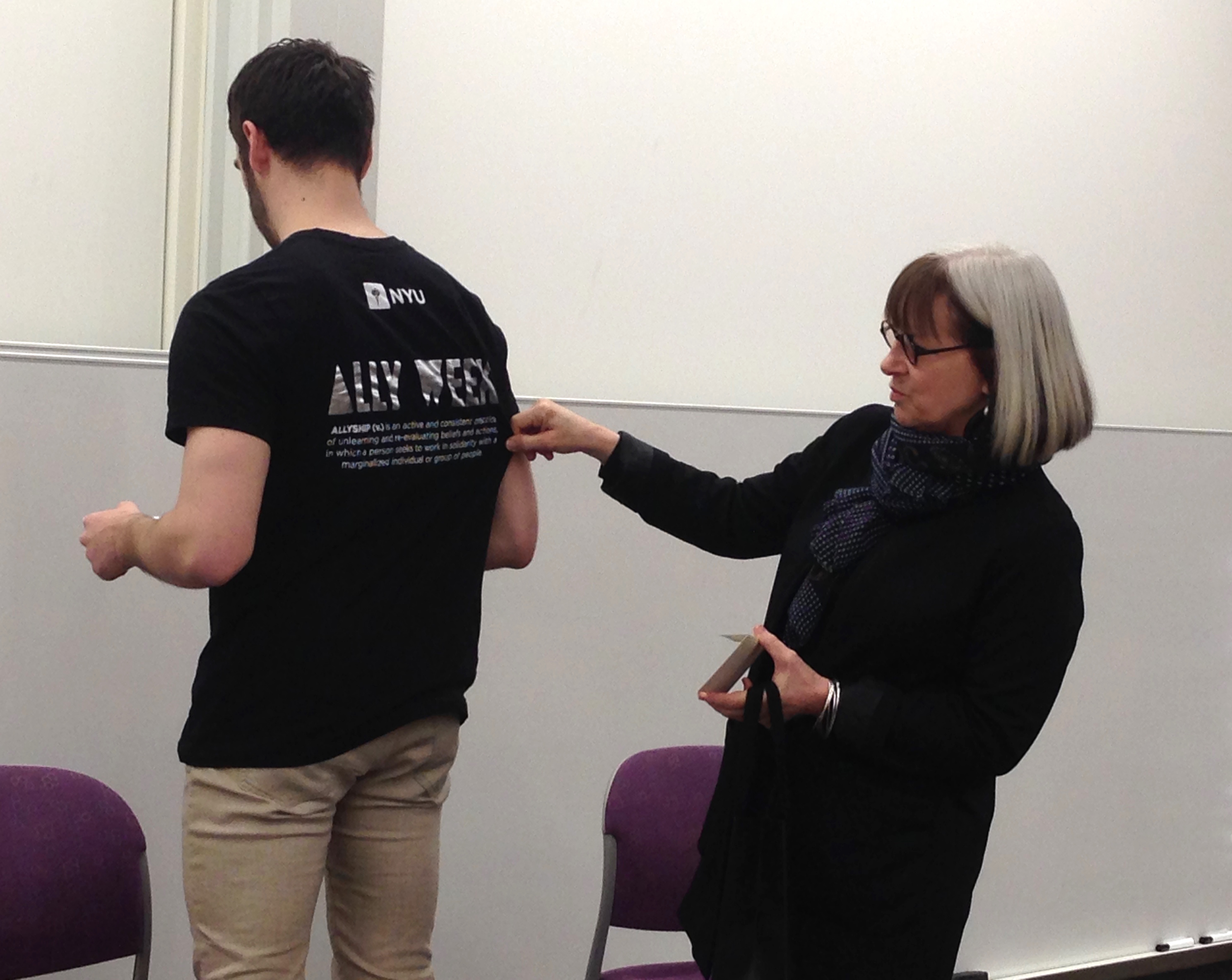
The university defines allyship as “an active and consistent practice of unlearning and re-evaluating beliefs and actions, in which a person seeks to work in solidarity with a marginalized individual or group of people.” Kicking off the week by asking the student body to “Pledge Your Allegiance,” the Stern Ally Week team put on a full week of programming:
On Monday, Google representatives joined us for lunch to host “Being Google-y: An Education in Allyship,” a presentation about the firm’s diversity and inclusion efforts, followed by an interactive workshop co-led by Stern MBA1s. In an abbreviated version of the day-long discussions Google facilitates with its employees and outside organizations, we broke out into groups to brainstorm answers to questions such as what mindset allies have and how allyship manifests itself in actions. Each group then presented their answers to the room and answered questions from the “Naysayers,” who were tasked with voicing difficult but common objections to allyship that marginalized people often face. Personally, I was able to walk out of the workshop feeling more confident about how to recognize offenses against allyship and more determined to tactfully address them.
On Tuesday, the Asian Business Society (ABS), Association of Hispanic and Black Business Students (AHBBS), Jewish Students Association (JSA), OutClass, Stern Women in Business (SWIB), Military Veterans Club (MVC), and Stern in Africa (SIA) each hosted Lunch Circles, small lunches led by student club leaders and each featuring a different topic of discussion around various diversity issues. In the evening, ABS co-presented with the Asian American Federation “From Yellow Peril to Islamophobia: How Asian Stereotypes Impact Our Lives Today,” a panel moderated by Arun Venugopal, reporter and host of WNYC’s Micropolis, and featuring Deepa Iyer, racial justice activist, lawyer, and author of We Too Sing America; Kermit Roosevelt, professor of law at the University of Pennsylvania and author of Allegiance; and Chris Kwok, civil rights activist and mediation supervisor at the U.S. Equal Employment Opportunity Commission. Focusing on the internment of Japanese-Americans in the 1940s, the panel related the prejudice and fear the Japanese-Americans faced then to what Muslim-Americans are facing today. The panel also spoke about how the lack of attention to these issues, as well as the continued lack of knowledge about a group of people overall, can continue to propagate these prejudices until addressed.
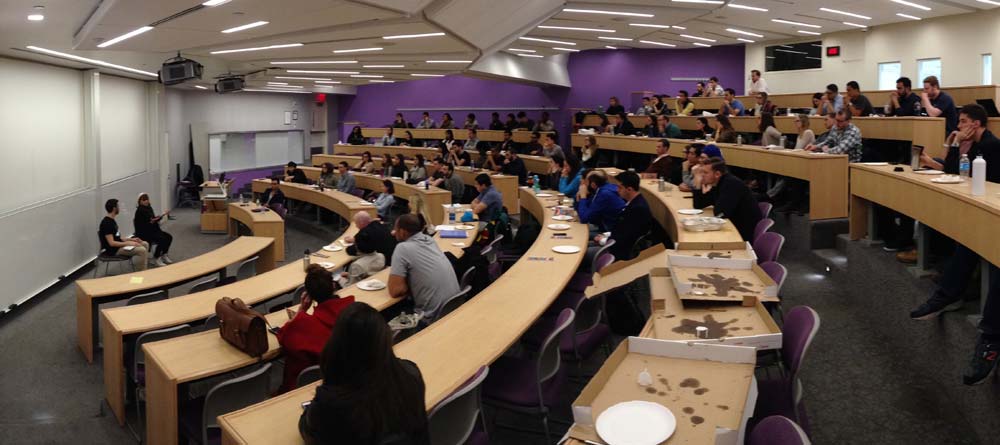
On Wednesday, during lunch we gathered for a screening of Academy Award-winning short film “Trevor,” the story of a 13-year-old boy whose discovery of his sexuality leads him to contemplate suicide. In the following Q&A, the film’s director (and NYU Tisch professor) Peggy Rajski explained why she decided to make the film, stating that as a straight female she still resonated with the alienation and mortification faced by the titular gay male protagonist (who first appeared in a one-man show created by the film’s writer James Lecense). The success of the film alerted Peggy to the unaddressed needs of LGBTQ youth across the country, and consequently, in the three short months preceding the HBO premiere of her film, she and her producing partners set up the Trevor Lifeline, the nation’s first crisis intervention and suicide prevention hotline for young LGBTQ people. The hotline has since evolved into The Trevor Project, a nonprofit offering numerous intervention and prevention services to young LGBTQ youth, and Peggy cites the importance of the nonprofit in letting kids know that “someone is there for me” so that they can “get through and choose life.” Afterwards, Jason Daniel Fair of The Trevor Project’s New York office took the stage to reiterate Peggy’s point and highlight the importance of allyship, citing the fact that for many LGBTQ youth, getting in touch with people who can help them can be exceptionally hard when their community acts in a way that prevents them from doing so.
On Thursday, the Ally Week team organized an “Ask Anything” Forum where everyone in the room had a safe space to ask any questions they had to representatives designated by AHBBS, Outclass, and SWIB to represent the black, gay, and female communities. While I had to sit this one out for a class, a friend told me afterwards that although the purpose of the session was to remove judgment from the conversation, she could not help but notice how inherently hurtful some of the questions were, even though she knew that the people asking them had no intent of upsetting their fellow classmates.
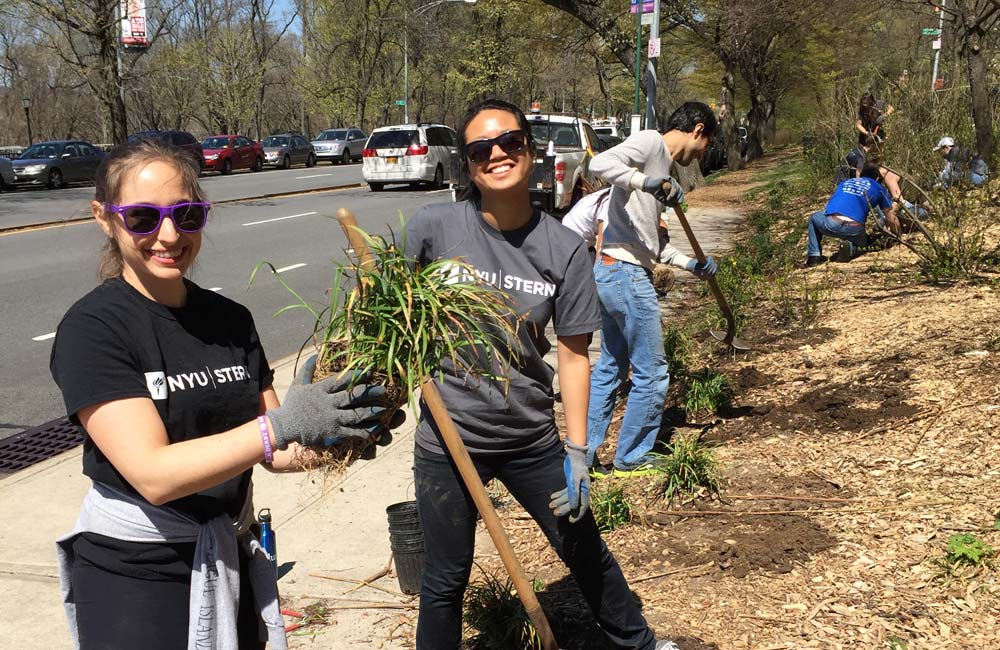
Ally Week wrapped up with its Days of Service. On Friday, a group of us did some weeding and planting for the Riverside Conservancy Park on the Upper West Side, and on Saturday, a group of Sternies met up for the New York Cares Spring Day of Service, joining thousands of other volunteers to clean up the city’s public outdoor spaces.
Again, we know there is still so much we can do to support diversity and allyship, but I can promise you that we at Stern are dedicated to seeing this effort through.
Block 2, I Love You
When you first start business school, you can’t necessarily comprehend the extent to which you will bond with your classmates and your blockmates in particular. It has now been five months since I first met this astonishingly diverse group of people, and I am reluctant to imagine what my life would have been like had Stern not brought us together in this one place at this one time.
Before school started, there were some self-organized gatherings. The air was warm, the days were still long, and the trees in nearby Washington Square Park were lush and green. Around the corner from Stern, 10 to 20 of us would meet up for Happy Hour and talk about what had become our pasts—where we grew up, where we last lived, what job we just quit (or still needed to quit).
I’m a born-and-raised New Yorker but was returning home from a three-year stint in Los Angeles, where I worked as a script reader, screenwriter, and director’s assistant. Many people had been living and working in the city in various occupations. Some grew up in the States, yet others were from places as far away as Taiwan and New Delhi—one had gotten off the plane just a day before, and his wife had yet to join him!
It wasn’t until LAUNCH when I met my block (Block 2!) in its entirety, all 67 of us. I was pleasantly surprised at how genuinely kind and down-to-earth everyone was (Stern definitely has the IQ+EQ thing down pat), but at that point, I still had no idea to what lengths we would go to befriend and support one another.
On an average night.
Fast forward past midterms, during which my blockmates and I took over the Starbucks Lounge even more so than we usually do (see above) to study together. Fast forward past a brutal recruiting season, during which we’d check in on each other and post silly things in the group messenger app to keep morale up. Fast forward to “Blocksgiving,” when a random bunch of us (and a few partners) came together before the weekend was over, on the eve of dozens of summer internship application deadlines, to share a homemade meal with each other.
At Stern no less.
Skip ahead to the last day of classes, when half of us celebrated by running down the street from Stern to our unofficial block watering hole and catching up with each other into the night. Then jump ahead one day, when we rallied together the next morning in a last-minute push to donate to Stern’s Toys for Tots Drive. I’m proud to say the effort was especially rewarding, for in addition to doing good, as the block with the highest participation we were awarded enough block points to clinch the Block Points Championship for the semester.
At this point I’m bragging, but how could I not? And don’t get me wrong—there are amazing people in the other five blocks too. But as I recall from Blocksgiving, sitting in a room at Stern with good company, laughing and trying not to choke on apple crumble and coconut cream pie, I thought to myself what I was thankful for, and my current situation came to mind.
I am thankful for Stern, for giving me the chance to challenge myself and to be among people who are brilliant in both heart and mind. I am thankful for my block for being the best block so thoughtful, supportive, fun, and hilarious, truly (I could go on about our beer receivables and sock puppies but I don’t think you’d get it, sorry!). And I am thankful for these moments, now memories, shared by the lot of us, a wonderful group that would have had little reason to ever come together had we not been given the opportunity that we have now.
And as we come back from break, we hope you had the:
